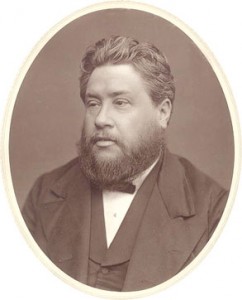 As one of the nineteenth century’s most prolific preachers and writers, Charles H. Spurgeon was pastor for 38 years at New Part Street Chapel, London, which later became the Metropolitan Tabernacle. Spurgeon had a gift for expressing clearly biblical truth. In one of his devotional writings on Psalm 119:53 (KJV), “Horror hath taken hold upon me because of the wicked that forsake thy law,” the Christian is admonished to sorrow for the sins of others. For by such is a Christian brought back to his need for repentance and the pursuit of holiness.
As one of the nineteenth century’s most prolific preachers and writers, Charles H. Spurgeon was pastor for 38 years at New Part Street Chapel, London, which later became the Metropolitan Tabernacle. Spurgeon had a gift for expressing clearly biblical truth. In one of his devotional writings on Psalm 119:53 (KJV), “Horror hath taken hold upon me because of the wicked that forsake thy law,” the Christian is admonished to sorrow for the sins of others. For by such is a Christian brought back to his need for repentance and the pursuit of holiness.
My soul, do you feel this holy trembling at the sins of others? For if you do not, you lack inward holiness. David’s cheeks were wet with rivers of waters because of prevailing unholiness. Jeremiah desired eyes like fountains that he might lament the iniquities of Israel, and Lot was deeply troubled by the conduct of the men of Sodom. Those upon whom the mark was set in Ezekiel’s vision were those who sighed and cried for the sins of Jerusalem. Gracious souls cannot help but be grieved to see what pains men take to go to hell. They know the evil of sin experimentally [experientially], and they are alarmed to see others flying like moths into its blaze. Sin makes the righteous shudder because it violates a holy law that is in every man’s highest interest to keep; it pulls down the pillars of the nation. Sin in others horrifies a believer because it makes him think of the baseness of his own heart: When he sees a transgressor he is reminded of his own frailty and vulnerability: “He fell today, and I may fall tomorrow.” Sin to a believer is horrible because it crucified the Savior; he sees in every iniquity the nails and spear. How troubling it should be when the Christian learns to tolerate rather than shrink from it in disgust. Each of us must examine his heart. It is an awful thing to insult God to His face. The good God deserves better treatment; the great God claims it; the just God will have it or repay His adversary to his face. An awakened heart trembles at the audacity of sin and stands alarmed at the contemplation of its punishment. How monstrous a thing is rebellion! How dreadful a doom is prepared for the ungodly! My soul, never laugh at sin’s fooleries, lest you begin to smile at sin itself. It is your enemy, and your Lord’s enemy: Learn to detest it and to distance yourself from it, for only then can you give evidence of the possession of holiness, without which no one can see the Lord.[i]